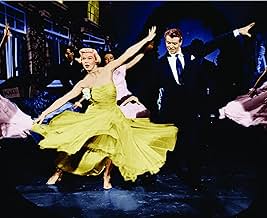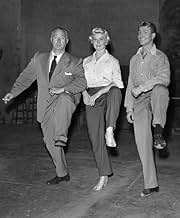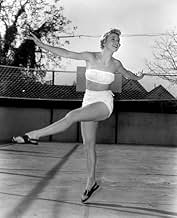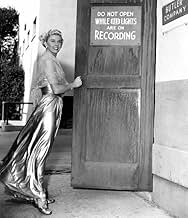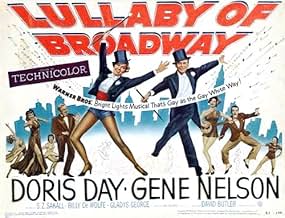IMDb RATING
6.7/10
1.4K
YOUR RATING
A showgirl returns to her New York home to visit her alcoholic mother, where she catches the eye of a Broadway producer.A showgirl returns to her New York home to visit her alcoholic mother, where she catches the eye of a Broadway producer.A showgirl returns to her New York home to visit her alcoholic mother, where she catches the eye of a Broadway producer.
- Awards
- 2 wins total
Bill Alcorn
- Dancer
- (uncredited)
Murray Alper
- Joe the Bartender
- (uncredited)
Jimmy Aubrey
- Ship's Steward
- (uncredited)
Brooks Benedict
- Reporter
- (uncredited)
Lulu Mae Bohrman
- Party Guest
- (uncredited)
Tex Brodus
- Party Guest
- (uncredited)
- Director
- Writer
- All cast & crew
- Production, box office & more at IMDbPro
Featured reviews
Light entertainment at its best, a great guilty pleasure for your pc.
This film boasts surprisingly strong performances by a solid cast: let's say it, a cast humble enough to throw themselves into an odd sort of film: part melodrama, part musical, part fashion show for its star.
Radiating joie-de-vivre, out-singing anyone of her time, serious one moment then tongue-in-cheek the next, Day is a star, an under-rated one these days.
Gene Nelson's dancing is important to see if only to better understand Fred Astaire's. The Astaire difference was this: talent, yes, Nelson had it as well, but not the ability to bring us to the brink of something endless through his motions: to make you know he was on the edge of something vast and mysterious; to suggest a whole unseen world by dancing in this one. Bravo, Fred!
This film boasts surprisingly strong performances by a solid cast: let's say it, a cast humble enough to throw themselves into an odd sort of film: part melodrama, part musical, part fashion show for its star.
Radiating joie-de-vivre, out-singing anyone of her time, serious one moment then tongue-in-cheek the next, Day is a star, an under-rated one these days.
Gene Nelson's dancing is important to see if only to better understand Fred Astaire's. The Astaire difference was this: talent, yes, Nelson had it as well, but not the ability to bring us to the brink of something endless through his motions: to make you know he was on the edge of something vast and mysterious; to suggest a whole unseen world by dancing in this one. Bravo, Fred!
I was only familiar with Doris Day from her later romantic comedies of the late 50's and 60's, many with Rock Hudson. I also was a fan of her T.V. Show and her great Hitchcock movie with Jimmy Stewart, "The Man Who Knew Too Much." This was the first of her early movies that I have seen, and she is simply sunshine in a bottle. She seems to be enjoying every minute of every scene. Her joy is infectious. It is hard to watch the film and not respond to her by cheering up, no matter how your day may be going. Her supporting cast are also delightful and seem to be enjoying themselves. It was great to see Gladys George repeating her "Shantytown" song which she sang to James Cagney in "Twentieth Century" 13 years before. Billy De Wolfe is total gay delight as butler. He explains that he is really an actor, but took the butler job because of a "crazy, mad desire to keep from starving." Anne Triola compliments him perfectly as his maid/fiancé and they do an hilarious duet together. S.Z. Sakill steals the show as the flirtatious Broadway angel who is using his wife's money behind her back to invest in shows so he can oogle the actresses. Finally, there's Gene Nelson as Doris Day's song and dance partner. I have never seen him before, but he is quite a good dancer. At the beginning a fan tells him that he's the best dancer in the world. "It's you and me against Fred Astaire," he says. He does dance in Fred Astaire's style and is about as close to Astaire as anybody is likely to get. Typically, the male leads in musicals are the biggest problems, unless,they're Fred Astaire, Gene Kelley, or James Cagney, they're usually good dancers who can't act or good actors who can't really dance. Here, we seem to have somebody who can do both. The double plot has a) Doris Day coming back to New York to see her mother who she thinks is a big star, but is only an alcoholic cabaret singer, and b)some Broadway entertainers trying to entice S.Z. Sakill to invest his wife's money in a Broadway show. Not too original, but great one liners keep it moving cheerfully along between about a dozen small scale musical numbers. The director wisely understood that with Doris Day singing, you don't need Busby Berkeley super-sets or super choruses. This is a must for Doris Day fans and a wide toothy smile for everybody else.
Another of my most enjoyable movie musicals with my favorite star, Doris Day, singing and dancing with Gene Nelson. I'll never forget the tap dance they did together going up a staircase-fantastic! An excellent cast includes Gladys George, and two of the funniest men around in the 50s: cute S.Z. Sakall and that buggy-eyed looney Billy DeWolfe who will tickle your funnybone. Sakall played in most of Doris' musicals and he is a character to remember! Whatever happened to Gene Nelson? He was surely a fine dancer!
If you can leave reality at the door, you're going to enjoy LULLABY OF Broadway. Doris returns from Europe hoping to surprise her mother who she thinks is a big Broadway star. She actually has fallen on bad times and is singing in a dive the the Village. When Doris arrives to her mothers supposedly grand home, the staff covers and says her mother is on tour. Instead of fretting, why doesn't she just ask what show and what city she is in? Then, of course, there would be no plot which is almost plot less anyway. Another "leave reality at the door" is when Gene Nelson at a gala says to Doris, "Hey, let's do that number we've been rehearsing" Then is seconds the full chorus and costumes and scenery appear!!! What?? Aside from that I really enjoyed this movie. Great numbers and wonderful acting by all. Too bad the story wasn't as good as the other aspects. This is part of the Doris Day collection and is certainly worth a look, implausible as it is. But then aren't all musicals?
If you love Fifties movie-musicals that stress music over story, "Lullaby of Broadway" is the prototype. It takes moviemaking back to the Astaire-Rogers films, which highlighted dancing, music, and wisecracking dialogue. "Lullaby" isn't quite "Top Hat", but it does represent a trend where old, sentimental hit tunes are given updated arrangements and settings.
In her autobiography, "Doris Day: Her Own Story" (published in 1976), the actress describes her early years as a contract player for Jack Warner and the heated disputes she had with the autocratic movie czar over miscasting and bad scripts. But in "Lullaby," there is virtually no script to complain about. It's mainly a revue. But what a revue! From Ray Heindorf's jazzy rendition of the old title tune (from "Gold Diggers of 1935") over the opening credits to the end, this movie clicks along in high gear from one showstopper to the next.
Day also recalled in her memoirs that "Lullaby" contained, by far, the toughest dance routines of any film she ever made. One especially challenging scene called for her to perform an intricate series of steps on a huge staircase while weighed down in a gold-lame dress. At first, she balked, warning the crew to have an ambulance waiting after the first take. With encouragement from the director David Butler and others, however, she managed to complete the number.
"Lullaby of Broadway" is not the best of the Day/Warners musicals--that distinction goes to "Calamity Jane" (1953)--but it's as good as the rest. With Gene Nelson as Day's love interest, Billy De Wolfe as a vaudevillian-turned-valet, and S. Z. Sakall as a Broadway "angel."
In her autobiography, "Doris Day: Her Own Story" (published in 1976), the actress describes her early years as a contract player for Jack Warner and the heated disputes she had with the autocratic movie czar over miscasting and bad scripts. But in "Lullaby," there is virtually no script to complain about. It's mainly a revue. But what a revue! From Ray Heindorf's jazzy rendition of the old title tune (from "Gold Diggers of 1935") over the opening credits to the end, this movie clicks along in high gear from one showstopper to the next.
Day also recalled in her memoirs that "Lullaby" contained, by far, the toughest dance routines of any film she ever made. One especially challenging scene called for her to perform an intricate series of steps on a huge staircase while weighed down in a gold-lame dress. At first, she balked, warning the crew to have an ambulance waiting after the first take. With encouragement from the director David Butler and others, however, she managed to complete the number.
"Lullaby of Broadway" is not the best of the Day/Warners musicals--that distinction goes to "Calamity Jane" (1953)--but it's as good as the rest. With Gene Nelson as Day's love interest, Billy De Wolfe as a vaudevillian-turned-valet, and S. Z. Sakall as a Broadway "angel."
Did you know
- TriviaWhen Doris Day's character is questioned by reporters about an affair she's supposedly having with S.Z. Sakall's character, one of them asks her, "Is it true you call him 'Cuddles'?" This is an inside joke, as Sakall's nickname in real life was "Cuddles".
- GoofsGloria reads a copy of Variety with news on the back cover; in reality, the back cover of this publication has always been reserved for full-page ads.
- Quotes
Melinda Howard: [handing Tom a penny] There's a message on that to you from the women of the world.
Tom Farnham: In God We Trust
- ConnectionsFeatured in The 69th Annual Academy Awards (1997)
- SoundtracksLullaby of Broadway
(uncredited)
Music by Harry Warren
Lyrics by Al Dubin
Sung by Doris Day
Danced by DDoris Day and Gene Nelson and mixed chorus
- How long is Lullaby of Broadway?Powered by Alexa
Details
- Release date
- Country of origin
- Language
- Also known as
- Das Wiegenlied vom Broadway
- Filming locations
- Production company
- See more company credits at IMDbPro
- Runtime
- 1h 32m(92 min)
- Aspect ratio
- 1.37 : 1
Contribute to this page
Suggest an edit or add missing content




